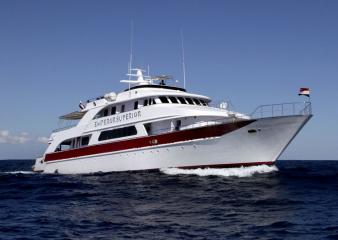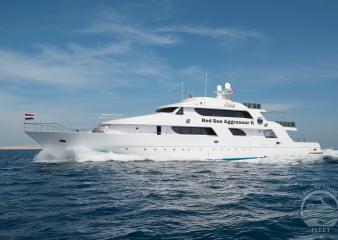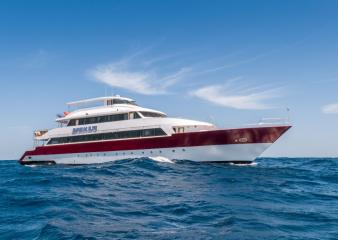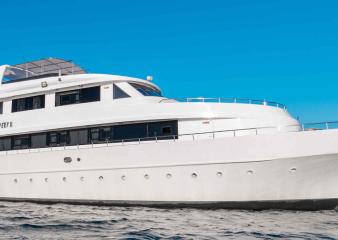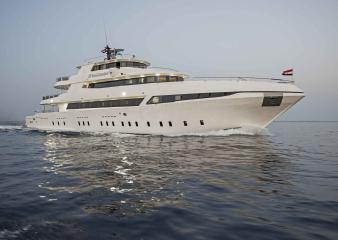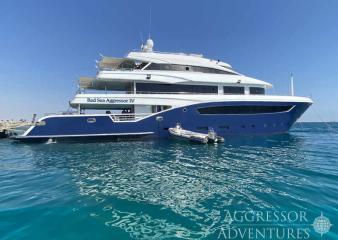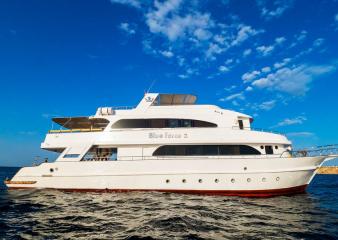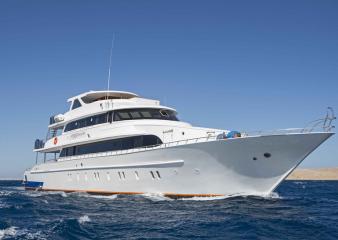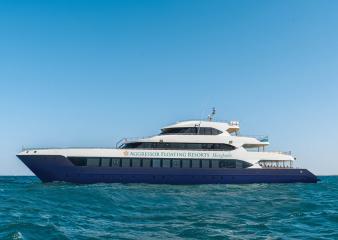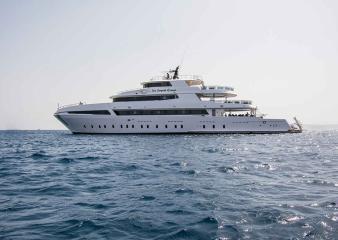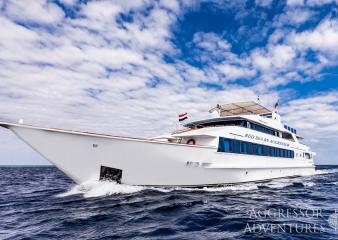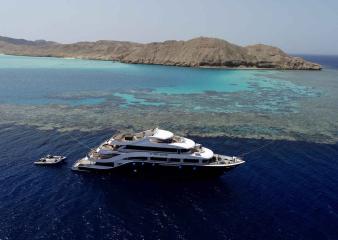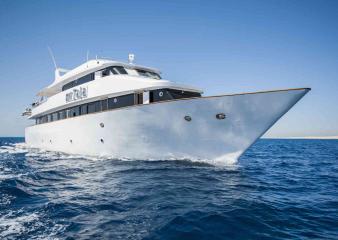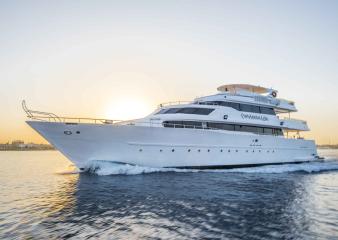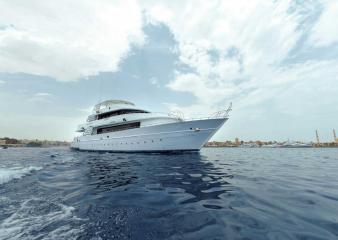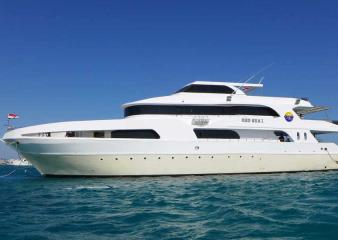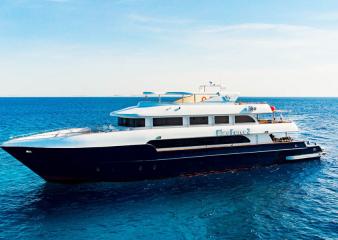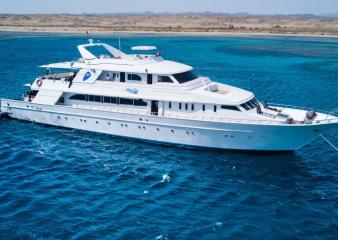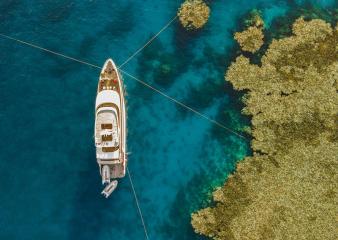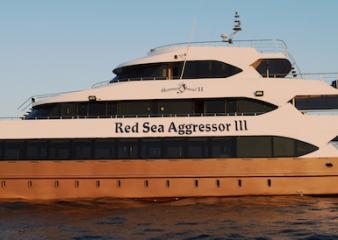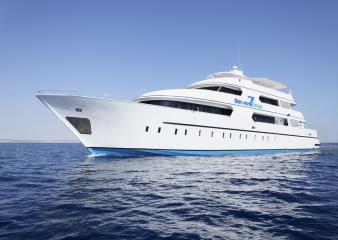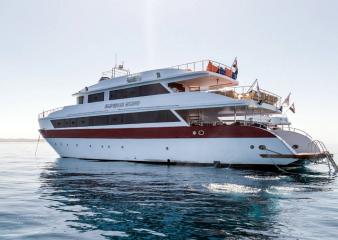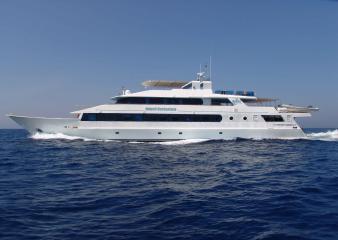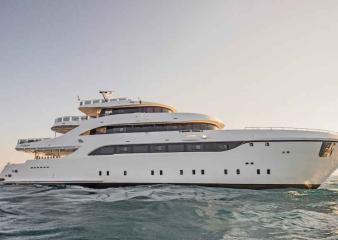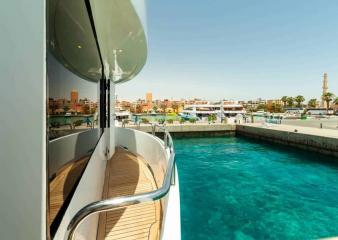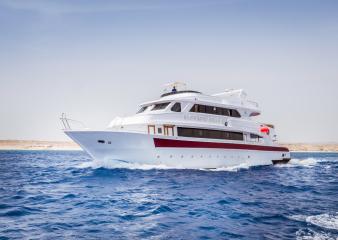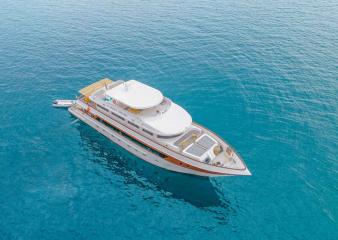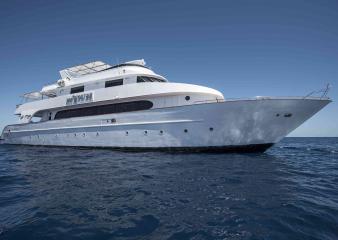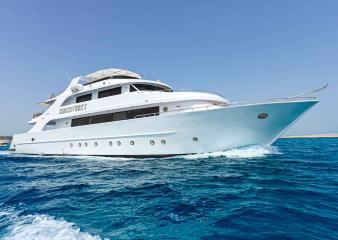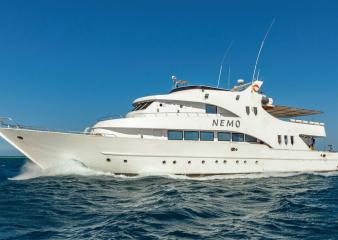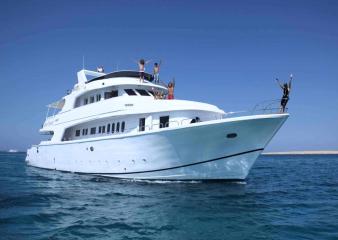The Red Sea is known for its wide range of high-end yet affordable dive liveaboards, offering a wide variety of itineraries. Similar to the Maldives, you can enjoy luxurious amenities at a lower price than you might find in other world-class dive destinations. In addition, there are a good number of budget liveaboards that still maintain comfortable accommodations and excellent service at lower rates. To give you an idea, almost all liveaboards in the Red Sea cost around $150/night or less.
The Red Sea boasts prolific marine life, home to over a thousand fish species, one-fifth of which exist exclusively in this body of water. Expansive coral reefs, wrecks, and deep walls offer something for every type of diver, and it is also a great destination for shark enthusiasts.
Most liveaboards depart from the Egyptian ports of Hurghada, Marsa Ghalib or Marsa Alam, however, it is also possible to dive the Sudanese coastline, departing from Port Sudan. The Red Sea is diveable year-round, with liveaboard boats taking a break in January when the water is at its coldest.
RED SEA LIVEABOARD ITINERARIES
Here are some of the most common dive areas visited by Red Sea Liveaboards.
Northern Wrecks and Reefs (Straits of Tiran)
The best of the Red Sea’s wrecks can be found in the northern coastal waters around Egypt’s Sinai Peninsula. Liveaboards exploring this area have a choice of dozens of shipwrecks, including the wooden-hulled Dunraven, Rosalie Moeller, the fascinating engine room of the Giannis D, and of course the world-famous SS Thistlegorm. The reefs that these wrecks have floundered on are also spectacular, teeming with life and healthy corals. Even though mild currents can be expected, sheltered sites favoring calm conditions make this an ideal destination for new divers.
Ras Mohammed Marine Park
One of the best protected marine areas in Egypt, located on the southern tip of Sinai where the waters of the Gulfs of Aqaba and Suez meet. Strong currents bring a good range of pelagic species in to mix with the local reef life, steep drop-offs, and walls adding drama to the diving. Yolanda Reef and Shark Reef are two of the most popular sites here and it’s not uncommon to spot barracuda, jack, and snapper lingering out in the blue.
The Brothers, Daedelus, and Elphinstone Reefs
Further south the remote reefs of The Brothers, Elphinstone, and Daedalus are only accessible by liveaboard. Small Brother plateau is the best place for shark sightings, with a good chance of spotting oceanic whitetips, threshers, silky, and the occasional hammerhead shark. At Daedelus, large schools of hammerheads are not uncommon in the strong currents, with trevallies and tuna also making a regular appearance along the island’s steep north face. Elphinstone is known for its rich diversity of marine life, huge gorgonian fans and sea whips characterizing the reef plateau. All three sites boast deep walls and drop-offs and can be subject to the more challenging conditions typical of outlying reefs.
Fury Shoal, St John’s Island (Zabargad), and Rocky
The most southerly of the Egyptian Red Sea areas, relaxed and very varied diving features colorful reefs and plenty of macro life. The vast reef and plateau systems of Fury Shoal and St John’s Island offer a plethora of gentle drift dives through abundant coral gardens featuring turtles, dolphins, sharks, and bumphead parrotfish. Just south of the Tropic of Cancer, turquoise blue lagoons feature a multitude of wildlife both above and below the surface, and the southernmost tip of Rocky attracts good amounts of pelagic life, including manta rays.
Suakin (Sudanese Deep South)
Departing from Sudan, the diving around Suakin is wild and relatively untouched, with far fewer visitors exploring these exotic waters. Pristine reefs, huge shoals of fish, and plentiful pelagics attract experienced divers who are seeking a step up from the Egyptian Red Sea itineraries. Additional challenges in the form of deeper dives and wreck penetration are also available.
Find a liveaboard in the Red Sea
Best price guaranteed. No credit card fees. Live chat support available!
Need more options? Can't see the boat you're looking for? Scroll down for the full list of liveaboards available at Bluewater Travel.
Email us or write to us through the live chat box for booking assistance.
The rates shown below are per person in USD. Some of the operators quote in other currencies and the pricing at the time of booking may vary depending on the latest exchange rates.
red sea liveaboard diving
diving season
March to May and September to November are often cited as the best time to dive in the Red Sea. However, diving is available year-round with cooler temperatures from October to May and warmer weather from June to September.
March to May is also known to be the best time to spot a whale shark, and considered the peak season, so some dive sites may get crowded. June to August is quieter for the Red Sea. The hot topside temperatures can make you uncomfortable, but it's still worth considering since you may encounter hammerhead sharks! September to November--the fall season--offers comfortable water and topside weather and therefore might attract more crowds, just like the spring months!
See more information on our in-depth guide to diving in the Red Sea.
- Diving Season: Diving in the Red Sea is year-round, but March to May (peak season) is the best time to spot a whale shark. June to August calls for warmer weather and possible hammerhead shark encounters, while September to November (fall season) offers comfortable water and topside weather.
- International Airports: Sharm El Sheikh International (SSH) or Hurghada International Airport (HRG)
- Local Airport: Most trips depart near the international airports, but there are multiple local airports spread out along the Red Sea.
- Water Temperature: Temperatures in the Red Sea reach 84F (29C) in the summer months, with temperatures as low as 70F (21C) in the cooler months.
- Wetsuit: 3mm-7mm wetsuit
- Required Diving Skill Level: There are sites to suit every diver from beginner to advanced. There are drift dives available, but for the most part, the Red Sea maintains very calm conditions.
LIveaboards in the red sea
Bluewater Travel can help you book a liveaboard in the Red Sea and over 30 other destinations in the world at the same price or even lower than booking any other way. We know the boats, cabins, diving, and logistics better than anyone else in the industry. Email us today or leave us a message through the live chat box to start planning your dream dive vacation in the Red Sea!

